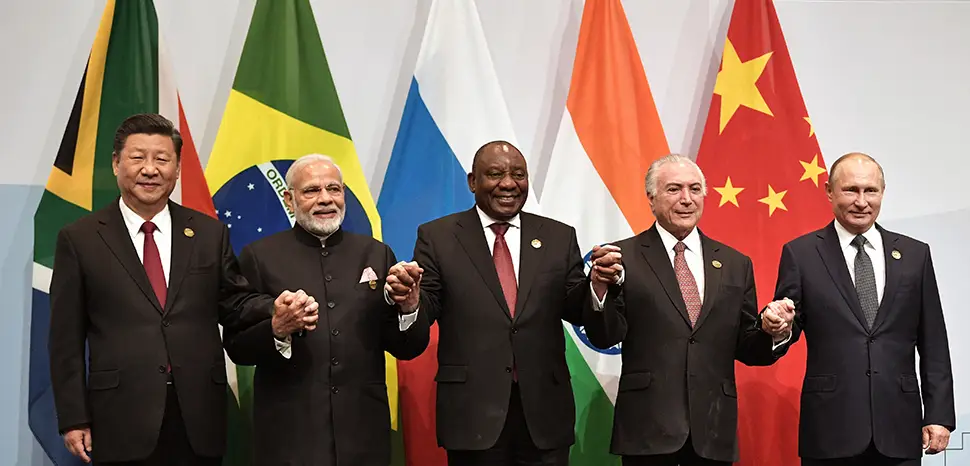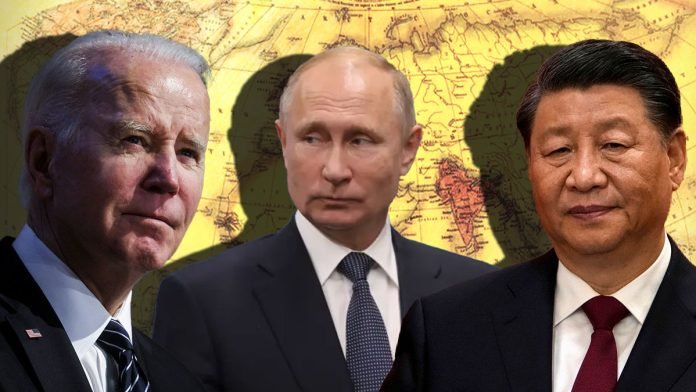The Rising BRICS: Can They Topple Dollar Supremacy?
The era of unrivalled American economic hegemony may be drawing to a close. The rise of the BRICS nations and increasing challenges to dollar dominance raise an intriguing question: What would the world look like if America were no longer the dominant global economic power?
The impacts could be profound, both for America and the international system it has led since World War II. America’s domestic economy and way of life could face major upheaval. The dollar’s status as the global reserve currency, a major source of American leverage, could be eroded. The centre of gravity of the global economy could shift decisively towards Asia.
What would be the consequences for America’s global leadership role? How would relations with major powers like China evolve? Would the decline be gradual or rapid? Can America adapt to a multi-polar economic order where it remains influential but not preeminent?
Alarmists argue America must maintain economic supremacy at any cost to preserve its security and way of life. Yet history shows global economic leadership is not permanent. The UK ceded its leading role to America during the World Wars, adapting successfully to its reduced status.
Of course, this would not mean the end for America, It retains an arsenal of formidable strengths, spanning innovation, technology, higher education, entrepreneurial zeal, and an unwavering commitment to the rule of law. Infused with pragmatism and deft diplomacy, America can, with certainty, continue to thrive and champion its national interests in a nascent multi-polar order. However, it might relinquish the unbridled preeminence it once enjoyed.
Accepting this reality, rather than desperately clinging to unsustainable dominance, offers the best path forward. Vacuums in global leadership breed instability and conflict, as the 1930s showed.
But can this alliance of major emerging economies realistically usurp America’s financial hegemony?
Challenging Western Hegemony: BRICS as a Power Bloc

But with the opening salvo was fired by none other than Russian President Vladimir Putin, who, unable to attend the summit in person due to alleged war crimes charges, addressed the gathering via video link. It shows they mean business. In his address, Putin emphasised the summit as a representation of the “global majority,” a strategic move to underscore the BRICS’ alignment with the aspirations of a world community that transcends Western influences.
This rhetoric reverberates, signifying that Russia and China no longer content themselves with the BRICS’ original charter of shared prosperity; they now aspire to harness their collective economic prowess as a counterweight to the geopolitical dominance held by the West.
The presence of China’s President Xi Jinping at the BRICS summit underscores the alliance’s growing geopolitical significance beyond mere economic cooperation. As the richest BRICS nation, China seeks to leverage the bloc to shift the global order toward a Sino-centric paradigm that challenges Western dominance.
Make no mistake, China and Russia are orchestrating an evolution of BRICS beyond a mere trade bloc. Their vision is to pool the economic might of this assembly, representing a staggering 40% of the world’s populace and a colossal $27.7 trillion in economic output, in a bid to recalibrate the global scale of geopolitical influence, tilting it away from the West.
The quest to enlarge the BRICS’ membership to encompass over 40 additional nations, some of which bear hostility towards Western powers—case in point, Iran—further underlines this audacious intention.
However, transforming this ambition into a tangible reality is an Everest-scale challenge. But the proposed endeavours such as common currencies and payment systems, are very real and very much logically grounded considering the economic blowback from sanctions on Russia, no matter how much they encounter the formidable practical hurdles.
Nevertheless, the hunger for autonomy remains tangible. By joining BRICS, nations seek to bypass the dominance of Western-led financial systems and assert national interests free from traditional external pressures. Still, stark divisions remain among BRICS members themselves, complicating its evolution into a cohesive counterweight.
“The old world is dying, and the new world struggles to be born: now is the time of monsters.” ― Antonio Gramsci
While BRICS’ future remains uncertain, China and Russia are clearly manoeuvring to build it into more than just an economic alliance. Yet rhetoric often outpaces reality. The group’s fractures may hinder grand visions of building an Eastern-dominated global order. But Western complacency would be misguided – BRICS’ economic heft and desire for autonomy will only grow.
The Brics become a threat when you understand the United States of America’s economic preeminence rests on the dollar’s role as the world’s primary reserve currency. This bestows immense privileges, including funding massive deficits easily and imposing sanctions that exclude target nations from global finance. Toppling dollar dominance would curb these powers.
However, the BRICS currencies lag far behind the dollar’s central role in global markets and institutions. The bloc lacks sufficiently deep and liquid capital markets or trusted institutions to support a credible rival reserve currency. De-dollarization also risks provoking destabilising US retaliation.
If, against all odds, the BRICS surmounted these towering barriers, the repercussions would be seismic. The United States would be bereft of its unchecked national credit card. Soaring interest expenses would thrust upon the nation onerous choices in terms of expenditure, while simultaneously weakening the efficacy of Washington’s potent sanctions mechanism.
This scenario would act as a catalyst in accelerating the trajectory towards a more multi-polar global order. Escalating costs of military expenditures would rein in the United States’ capacity for global power projection. Moreover, the nation would be bereft of the coercive economic tools it currently deploys to achieve policy objectives, such as the isolation of nations like Iran, Russia and even Cuba.
With national security priorities underfunded, the US would face pressure to adopt a more restrained foreign policy focused on core strategic interests rather than meddling worldwide. America could no longer maintain nearly 800 overseas bases at current force levels.
A Landscape of Opportunities and Challenges
As the 2023 BRICS Summit continues, much of which is behind closed doors, the world awaits to witness the unfolding dynamics within this influential alliance. The potential creation of a BRICS trading bloc, discussions on de-dollarisation, and the push for economic autonomy carry significant implications for the global economy and the existing power structures.
While this shift may be overdue, it would be wrenching for US political so-called elites accustomed to unchecked military primacy. However, endless counterproductive interventions have bred resentment abroad while draining resources needed to rebuild at home.
The emergence of a multi-polar economic order is inevitable. America remains formidable but must pragmatically adjust to new realities, as Britain did before it. With skill and flexibility, America can protect interests, sustain prosperity and uphold global stability in an emerging new era.
Ultimately America must evolve towards a more judicious strategy befitting 21st century realities. Constructive international leadership – not endless war and coercion – offers the best path to lasting national prosperity and security. The BRICS rise, while threatening, provides impetus America sorely needs to reform its overextended policies
Whether the tale is one of successful adaptation or missed opportunities remains to be seen. In the annals of history, the rise of the BRICS alliance, much like the UK’s transition to America’s mantle, may serve as a poignant reminder of the fluidity of power and the inevitability of change.
Support Independent Journalism Today
Our unwavering dedication is to provide you with unbiased news, diverse perspectives, and insightful opinions. We're on a mission to ensure that those in positions of power are held accountable for their actions, but we can't do it alone. Labour Heartlands is primarily funded by me, Paul Knaggs, and by the generous contributions of readers like you. Your donations keep us going and help us uphold the principles of independent journalism. Join us in our quest for truth, transparency, and accountability – donate today and be a part of our mission!
Like everyone else, we're facing challenges, and we need your help to stay online and continue providing crucial journalism. Every contribution, no matter how small, goes a long way in helping us thrive. By becoming one of our donors, you become a vital part of our mission to uncover the truth and uphold the values of democracy.
While we maintain our independence from political affiliations, we stand united against corruption, injustice, and the erosion of free speech, truth, and democracy. We believe in the power of accurate information in a democracy, and we consider facts non-negotiable.
Your support, no matter the amount, can make a significant impact. Together, we can make a difference and continue our journey toward a more informed and just society.
Thank you for supporting Labour Heartlands












